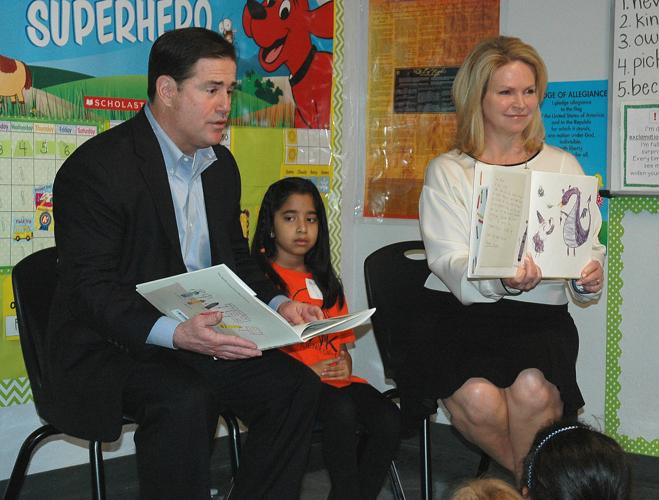PHOENIX — Gov. Doug Ducey vetoed two measures Monday that could have allowed some developers to get around requirements to show they have enough water to sustain their projects.
The governor said the bills, sponsored by Sen. Gail Griffin, R-Hereford, would have undermined provisions of state laws designed to protect the state’s water supply going back more than three decades. That, he said, made them unacceptable.
“We’re not going to allow bills that get in the way of the 1980 Groundwater Management Act or take away from the work of the people that have come before I came into office in protecting Arizona’s water,” Ducey told reporters of his opposition to the measures.
In a separate veto letter, the governor said Arizona has “a proud and longstanding reputation as a global leader in water management.”
He acknowledged Griffin’s concerns that the federal government was exercising too much control of the water supply in Cochise County in its bid to ensure the continued flow of water in the San Pedro River. But Ducey said there are greater issues at work.
“While I appreciate the sponsor’s efforts to protect Arizona from federal overreach, I’m concerned that SB 1268 and SB 1400 would encourage a patchwork of water ordinances throughout our cities and leave our water supplies in peril,” he wrote.
“Ensuring the certainty and sustainability of Arizona water is a top priority,” he continued. “I will not sign legislation that threatens Arizona’s water future.”
The actions are the second and third vetoes of the session. Ducey earlier this year rejected a measure mandating that students be taught cursive writing, a measure that, coincidentally, also was sponsored by Griffin.
Griffin did not return calls seeking comment.
The decision is a slap at not only Griffin but the two other Republican lawmakers who represent Cochise County, House Speaker David Gowan and Rep. David Stevens, who also pushed for the changes.
It also marks a defeat for a developer that had hoped to make an end-run around its legal problems that have thwarted its efforts to construct a 7,000-home development in Sierra Vista.
But Ducey called the two measures “some bad bills.”
Both measures have their roots in the 1980 law that has resulted in the creation of five “active management areas.”
For the Phoenix, Prescott and Tucson areas, the goal is “safe yield” by 2025, when the amount of groundwater withdrawn is no more than recharge. Pinal and Santa Cruz have other goals.
Outside those areas, developers must get a determination from the Department of Water Resources on whether there is a 100-year assured water supply.
But the lack of that does not prevent them from building. They do, however, have to disclose that fact to initial buyers.
The state law, however, does allow counties to mandate that 100-year showing of adequate water before construction can begin. Cochise and Yuma counties have adopted such ordinances.
What happened here is that Castle & Cooke, which is pushing the Tribute development in Sierra Vista, did get such a finding from the state water agency. But that was overruled by a judge who said the agency did not properly consider competing claims to the groundwater, including the Bureau of Land Management, which wants to protect the flow of the San Pedro River.
That ruling is under appeal.
In the interim, Griffin introduced two measures designed to short-circuit the need for the developer to win the lawsuit.
SB 1400 originally would have required county supervisors to review and unanimously re-enact its water-supply requirement within two years. Facing stiff opposition, she diluted it.
It still required review. But it would take a unanimous vote of the board to scrap the mandate.
The potentially more far-reaching measure would have allowed any city in either county to simply decide it was no longer subject to the county ordinance.
There were some conditions a city would have to meet, like having conservation plans and mandating low-water-use plans in rights of way. But SB 1268 was crafted in a way to ensure that Sierra Vista could fit within the law.
That would have allowed the City Council to simply opt out of the county ordinance and clear the way for the development. Calls to Castle & Cooke were not returned.
The veto also comes despite strong support for the measure from Gowan.
“The water belongs to us when it’s underneath that ground,” he said during floor debate. “This is private property we’re talking about.”
And he said it’s about economic development.
“We have enough to make sure we put people back to work and that other people who want a private home, who want private property, have that ability,” Gowan said.
The veto cheered Sandy Bahr, lobbyist for the Sierra Club.
“Both SB 1268 and SB 1400 created loopholes for special interests to avoid complying with important requirements for water adequacy and put at risk the health of our aquifers, streams, rivers and springs,” she said in a prepared statement.







